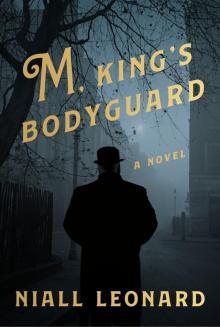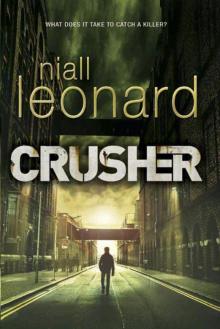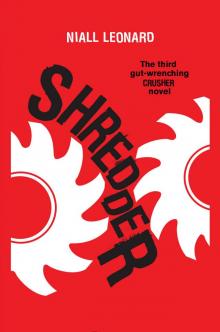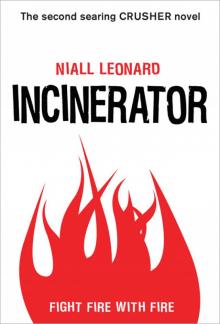- Home
- Niall Leonard
M, King's Bodyguard
M, King's Bodyguard Read online
This is a work of fiction. All incidents and dialogue, and all characters with the exception of some well-known historical and public figures, are products of the author’s imagination and are not to be construed as real. Where real-life historical figures and public figures appear, the situations, incidents, and dialogues concerning those persons are entirely fictional and are not intended to depict actual events or to change the entirely fictional nature of the work. In all other respects, any resemblance to persons living or dead is entirely coincidental.
Copyright © 2021 by Niall Leonard
All rights reserved. Published in the United States by Pantheon Books, a division of Penguin Random House LLC, New York, and distributed in Canada by Penguin Random House Canada Limited, Toronto.
Pantheon Books and colophon are registered trademarks of Penguin Random House LLC.
Library of Congress Cataloging-in-Publication Data
Name: Leonard, Niall, author.
Title: M, king’s bodyguard : a novel / Niall Leonard.
Description: First edition. New York : Pantheon Books, 2021
Identifiers: LCCN 2020026356 (print). LCCN 2020026357 (ebook). ISBN 9781524749057 (hardcover). ISBN 9781524749064 (ebook).
Subjects: GSAFD: Mystery fiction.
Classification: LCC PR6112.E646 M25 2021 (print). LCC PR6112.E646 (ebook). DDC 823/.92—dc23
LC record available at lccn.loc.gov/2020026356
LC ebook record available at lccn.loc.gov/2020026357
Ebook ISBN 9781524749064
www.pantheonbooks.com
Cover images: (man) Barry Lewis / Alamy; (background) Michael Ochs Archives / Getty Images
Cover design by Jenny Carrow
ep_prh_5.7.0_c0_r0
Contents
Cover
Title Page
Copyright
Dedication
Chapter 1
Chapter 2
Chapter 3
Chapter 4
Chapter 5
Chapter 6
Chapter 7
Chapter 8
Chapter 9
Chapter 10
Chapter 11
Chapter 12
Chapter 13
Chapter 14
Chapter 15
Chapter 16
Chapter 17
Chapter 18
Chapter 19
Chapter 20
Chapter 21
Chapter 22
Chapter 23
Chapter 24
Chapter 25
Chapter 26
Chapter 27
Chapter 28
Afterword
To my good friend Hugh O’Donnell
Culture buff and History nerd
See you in the park someday
1
It was a miserable day in Walham Green, gloomy and wind-lashed and rain-soaked, and it seemed every pedestrian for miles had taken shelter in this Lyons Tea Room. The windows streamed with condensation, and the air was thick with hot breath and the smell of damp wool and camphor and boiled mutton. I’d been lucky to get a table to myself, and I was keeping it to myself, spreading out my legs and seeing off with a cold stare any customer who dared to approach. Selfish of me, perhaps, but I was on the Queen’s business and expecting a guest. The waitress, a thin, nervous woman in her thirties, looked worn-out and listless, much like the paper garlands that still festooned the place three weeks after Christmas. She could barely move between the tables, the place was so packed with customers and their sodden overcoats and dripping umbrellas. Stopping by my table she topped up my cup hastily, slopping tea into the saucer, but I made no remark. There are times when it serves to make a scene and times to bite your tongue.
Jakob was late. He was always late. I was used to it, and I understood his reasons: he hated me, and everything I stood for, and himself for associating with me. I found it amusing all the same that he always contrived to be exactly fifteen minutes late. Even his contempt was precisely measured.
And on the dot he appeared, wrestling with the door handle while rain poured off the brim of his grubby slouch hat and a gust of wind tried to snatch the portfolio from under his arm. When at last he wrenched the door open it forced a loud brassy jangle from the bell, causing the young Latvian to freeze momentarily in the doorway. His eyes darted right and left, as if waiting for everyone to stop talking and turn and stare. He was worried about being seen in my company, of course, but I was just as concerned about that as he was. That was why I’d been seated here facing the door for over an hour, discreetly watching the customers come and go, checking for familiar faces.
But the hubbub continued unbroken; no one noticed Jakob or cared. He quickly relaxed and stepped in, pulling the door shut behind him and shaking the rain off his hat. His face was as pale and pinched as ever, and when his coal-black eyes met mine, he nodded, almost imperceptibly. I smiled, and it wasn’t just to put him at his ease. I was genuinely pleased to see the lad; I liked Jakob, for all his wrong-headed ideas. I liked his intelligence, and his passion, and his sincerity. All the things that made him dangerous, in fact.
He started making his way over. Barely in his twenties, he was so painfully thin he hardly needed to turn sideways to squeeze through the rows of seated customers, but all the same he jostled a few elbows and knocked a few hats askew with his portfolio. He ignored the angry stares; Jakob often mocked the English for their reluctance to complain even when they were perfectly entitled to, and he had a point. When at last he arrived at my table he did not greet me or offer to shake hands, but merely leaned his portfolio up against the table legs, hooked his hat on the nearest rack and unbuttoned his shabby overcoat. The rain had soaked through its thin material and into the worn jacket beneath. He’ll catch his death, I thought. I caught the waitress’s eye and summoned her over with a lift of my chin.
“Jakob, what will you have?”
“I am not hungry,” he said, shrugging. His words were addressed to the air rather than either of us.
“Away out of that,” I said. “You look half-starved, and you’re soaked through. Is that mutton stew I can smell?” This to the waitress.
“Not sure if we have any left, sir.”
“A bowl of that, if you do. Otherwise some of the oxtail soup.”
She nodded, and with a sharp glance at Jakob—his accent had clearly piqued her curiosity—she waded through the throng towards the kitchen.
“So, Jakob, how have you been?”
“The same. Coughing my lungs out.” His eyes flickered round the room again, checking for surveillance; old habits die hard. “This city stinks. I don’t know how you people can breathe the air.”
“It was bad the other day, right enough. Fog mixed with smoke. A proper London Particular. All the same, I dare say you can breathe more easily over here than back home.”
He didn’t smile, but he did meet my gaze at last.
“And how have you been, Mr. Melville? Cracked many heads this week?”
“I have not. Sure I employ people to do that for me.”
“Yes, I have seen them. Hanging around in the street outside our meetings. Sitting in the back of the hall.”
“Don’t worry. If they need to crack any heads, they’ll be sure to crack yours too.” Brushing tea from my moustache, I went on, “So, were you at the club last night?”
My lack of subtlety seemed to
amuse him, and he smiled at last.
“You have to ask? Were your agents taking the night off? You know, I thought the hall was not so full as usual.”
“And who was the speaker?” I already knew the answer, but I wanted to put Jakob at ease. He wouldn’t feel any reluctance telling me information I could easily have picked up from a handbill in Soho.
“The speaker? Some German fool,” sneered Jakob. “Rocker. Calls himself a ‘progressive anarchist.’ ”
“And what do you call him?”
“A cretin. A liberal democrat in revolutionary clothing.” Jakob’s smile must have been handsome once, before the Tsar’s policemen broke his teeth with their boots. “He claims the principles of anarchy are not fixed but must be revised in response to what he calls historical circumstance.”
“A pragmatist, then.”
“A bourgeois reactionary. Making his excuses in advance for betraying the workers. There is only one historical circumstance, the oppression of the proletariat, and that has not changed for a thousand years—”
Just as he was working himself up into a fine passion, Jakob fell silent, his face reddening, and looked away. He felt foolish, I suppose, for lecturing me on revolutionary theory. Detective Chief Superintendent William Melville, head of Scotland Yard’s Special Branch and occasional bodyguard to the British Royal Family, was hardly the type to be swayed by Marxist rhetoric. I raised an eyebrow, as if he’d made a valid point I needed to consider. I wasn’t about to argue with him, but I didn’t want to patronise him either, and it was a relief when the waitress banged down a plate of bread on the table between the two of us and a steaming bowl of mutton stew in front of Jakob. Forgetting his embarrassment, the young Latvian snatched up his spoon and dug in, wolfing down the meat and potatoes though they were so hot they must have scalded his mouth. The lad was famished. While he worked away, I stirred another spoonful of sugar into my tea and watched him from the corner of my eye. Presently he stopped for breath and wiped his chin on the sleeve of his jacket.
“I did see one new face,” he volunteered, his mouth half-full. I let him read surprise and curiosity on my face, and he hurried on, gratified. “An American, I think, though German or Dutch by birth, judging by his accent. I heard him asking Rocker for a copy of that so-called newspaper of his, Germinal.”
“And what did he look like, this American?” I was curious to hear if Jakob’s description matched the one I’d already heard; Sergeant Dawes hadn’t mentioned any accent.
“Thirty-one, thirty-two perhaps? Not so tall as you, or so big. Brown hair, like that man”—Jakob nodded at a slight, balding customer seated at the next table—“brown eyes, full moustache, no beard. His clothes were interesting.”
“Interesting how?”
“They were old and worn, like this”—he held out the sleeve of his jacket—“but he was no pauper. He was too well fed. His hair was too well cut.”
“Military?”
“He looked too intelligent to be a soldier.”
“A reporter, perhaps?”
“He took no notes. Not that informers do.”
“Interesting. I’ll make some enquiries.”
I felt Jakob peering at me as I sipped my tea. He was trying to make out if I was lying—perhaps I knew very well who this stranger was, and I was testing him. Then he seemed to decide that he could not tell, and that it did not matter. It was merely a crumb of information, worthless to his own cause, but something that I might value.
“Any old friends?” I enquired, as if I was worried about him being lonely. There was an instant of hesitation before he shrugged, his eyes flicking away. I didn’t press him: the details he was omitting carried their own significance.
“That smells good,” I said, nodding at the bowl. Jakob grunted and resumed eating, and I watched him until he’d cleaned the dish and was wiping the last of the gravy up with a heel of bread.
“Another?”
The anarchist shook his head. “I am full,” he said. “Thank you.” No sooner had he spoken than he blinked self-consciously, and almost bit his tongue. I stifled a sigh of pity. For a moment there he had lapsed into good manners, manners that had no doubt been beaten into him as a child. But now he felt ashamed of his petit-bourgeois upbringing, and of being so polite to me, an agent of the State. Mother of God, but these idealists make it so hard on themselves. They may sneer at those of us who have faith, but at least we Catholics can get absolution for our mistakes; they flog themselves daily with scourges of their own making.
“So, was there any other business?” I asked. Jakob frowned. “At your meeting.”
“No. Yes. We held a collection. For the family of Gaetano Bresci.”
“The assassin? The one who shot the King of Italy?”
Jakob snorted. “Assassin! The man who acted when others merely talked. For that he gets life in prison, in a cage too small for a dog.”
I wasn’t about to let that pass. “He’s lucky they didn’t hang him. He murdered King Humbert in front of two thousand people.”
“And why do you suppose he committed this outrage?” Jakob seethed with sudden indignation. “King Umberto’s troops opened fire on workers in Milan, protesting about the price of bread. Six hundred people died—men, women, children. Who was arrested for that? Who went to prison? Not the General who gave the order—noble King Umberto gave him a medal. But of course, for Mr. Policeman Melville, the life of one noble parasite is worth more than the lives of a thousand workers.”
“That was a shocking business, right enough,” I conceded.
“No, for the bourgeoisie, that was business as usual.”
Touché, I thought, and I nearly smiled, until I saw Jakob’s deadly serious face. He was driven by rage at brutality and injustice, and that was understandable—so was I, at his age. Indeed, I still was, but he could never grasp that, and I wasn’t going to try and persuade him. If he ever felt I was patronising him, or trying to manipulate him, or even acting directly on his information, disgust at himself would make him turn on me—perhaps drive him to prove his devotion to the Cause. Right now Jakob believed he was selling worthless gossip in return for a hot meal. His task was to make a fool of me, the infamous Melville, scourge of European anarchists; my task was to let him think he’d succeeded.
“How’s the painting going?” I peered over the edge of the tabletop at his portfolio, still propped against the table leg. It was meant to look like leather, thanks to the embossed oilskin glued to the cardboard, but the thin veneer was coming unstuck with damp and peeling away at the corners. “Has the Muse been good to you?”
Jakob shrugged in an attempt at modesty. “I have been working with charcoal. It has that essence of line.”
And it’s a damn’ sight cheaper than oils, I thought, but what I said was, “Show me.”
I cleared away the crockery, perching it on an empty table nearby, while Jakob picked up his portfolio, undid the loop of string that held it shut and opened it out across the table. The topmost sketch was of a horse in harness, rearing in fear or pain, the looming bulk of a pantechnicon behind it, the driver a shadowy figure raising his whip. I fell silent a moment, in sincere admiration. Jakob had real talent; this image was simple but powerful, and the way he evoked movement with a single swish of charcoal was masterful. For once I didn’t have to dissemble.
“I see what you mean about essence. This is excellent. The driver there—he’s just a notion, but you can see the power in his arm, the cruelty…”
The next sketch was of the same scene, but a few minutes later: the horse, still trapped between the shafts, had fallen to its front knees, its neck and head twisted back in agony. Its teeth were clenched on the bit as the driver laid into it with his whip.
“Is this taken from life?”
“I saw it happen, in Haymarket, last week. The driver, he flogged and f
logged the horse until it was nearly dead, and no one even tried to stop him.”
“There’s a scene like that in Dostoyevsky, isn’t there? Flogging a half-dead horse.”
“There are scenes like this everywhere,” said Jakob. His look said the rest: that the workers of the world were the horse being flogged, and men like me wielded the whip.
“I’ll give you a guinea for the two of them,” I said. Jakob gasped in disbelief, God help him.
“You like them?”
“ ‘Like’ is not the word. But they’re very striking.” I fished inside my coat for my pocketbook. Jakob, recovering from his surprise, affected an air of mocking cynicism.
“Where will you hang them? In your office in Scotland Yard?”
“I’ll hang them at home. Sure it’s my own money.” I leafed through the notes in my pocketbook, and Jakob tried not to stare at them hungrily. It was my own money, in the sense that I didn’t have to account for it. All the same, I kept a careful record of my payments to informants; many an honest copper has come to grief, accused of having his fingers in the till. And a few dishonest ones too, admittedly.
“Tell you what,” I said, “a pound and ten shillings, and you can pick up the bill.”
I laid a banknote and two crowns on top of the sketches and tucked my pocketbook back inside my jacket. Jakob picked up the money and stuffed it into a pocket, and I got the strong impression he was fighting the urge to whoop with joy. “And mind you leave a tip,” I added.
He looked insulted. “You think I would cheat a worker out of her earnings?”
“You might decide to make a contribution to the Cause on her behalf.” I tugged my watch from my waistcoat pocket and checked it. “I’d best be on my way. You’re a damned fine artist, Jakob. I think I prefer your work in oils, but that’s just me.”

 M, King's Bodyguard
M, King's Bodyguard Crusher
Crusher Shredder
Shredder Incinerator
Incinerator